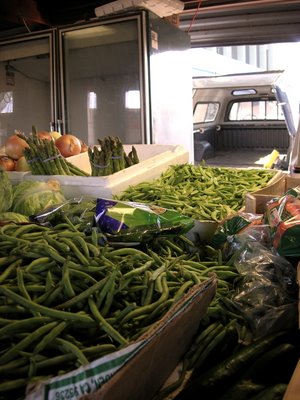Save Money by Shopping at Farmers' Markets
 At farmers' markets, customers pay similar prices (sometimes lower prices, depending on where you live) but get a vastly superior product--one that was picked the day before, at peak flavor and nutritional value. Even at stores like Whole Foods and Wild Oats where we pay a premium for what we think is better produce, that produce has likely been sitting around for up to a week before we even buy it. In my experience, farmers' market produce is much more flavorful.
At farmers' markets, customers pay similar prices (sometimes lower prices, depending on where you live) but get a vastly superior product--one that was picked the day before, at peak flavor and nutritional value. Even at stores like Whole Foods and Wild Oats where we pay a premium for what we think is better produce, that produce has likely been sitting around for up to a week before we even buy it. In my experience, farmers' market produce is much more flavorful.Farmers' markets give farmers the opportunity to reap a financial reward for doing good work and provide an incentive to grow crops that are outside the mainstream. A traditional farmer selling to a national supplier may make a profit of only a few cents per pound on his peaches, but if he sells directly to his customers via a farmers' market, he can earn a couple of dollars per pound. Similarly, while a national supplier may not pay a farmer enough to make it worth her while to grow tricky produce like Snow Queen nectarines, farmers' market customers will. By shopping at farmers' markets, I've discovered a love of produce I didn't even know existed, like persimmons and fresh figs (I ate almost exclusively canned fruit for the first 18 years of my life). I also like being able to interact directly with the farmers, who can authoritatively answer any questions about produce I'm unfamiliar with and provide samples so I don't waste money buying things I might not like.
Sometimes farmers' market produce may be more expensive than what you find at the grocery store. Keep in mind that farming, just like real estate, computer programming, or any other business, has significant overhead costs like rent, fuel, labor, and insurance. These things aren't cheap. Farmers' market produce, unlike the stuff from the supermarket, reflects the true cost of food--the cost to bring you fresh, sustainably grown produce. Unfortunately, the price does not yet reflect the true labor costs involved in raising food: due to the very high cost of living in California, where most of our country's produce is grown, it is rare that a farmer is able to pay his workers a living wage (keep in mind that this problem is not unique to the agriculture industry - most of the businesses you frequent probably aren't paying most of their workers a living wage, either).
Tags:Farmers' Markets Food Saving Money Farming
Related Posts:
How I Get Coupons for Organic Products
Does a Home Garden Really Save Money?


Comments
The farmers could be growing anything they wish for biomass for alternate fuel production, yet lands stay fallow to keep produce prices high.
As the family farms are sold, the beautiful acreage is divided, platted and sold to developers. We are losing our past and our land.
Sorry, I got off track there. I truly enjoyed your post.
Nice piece!